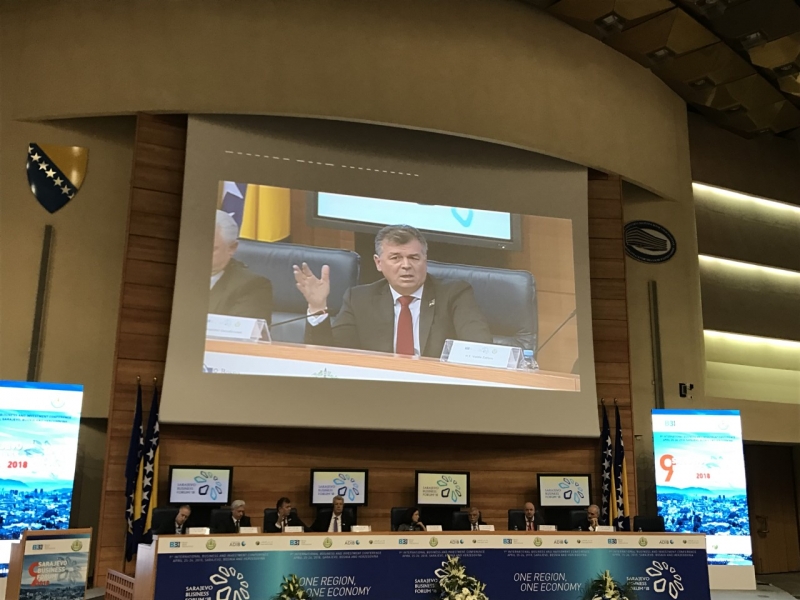“Digitalisation transforms our daily life and has a potential to take our society forward, providing also innovative business models and helping speedy resolution of administrative and other problems. Digital era changes the way in which we communicate and do business. Digitalisation based on modern network conditions and speedy Internet connections brings sustainable economic and social advantages. Clearly set strategic aims are precondition for digital transformation, and they have to be priority of every government and every parliament in modern societies, including the Government and Parliament of Montenegro”, Vice President of the Parliament of Montenegro Mr Branimir Gvozdenović said in his address during the Sarajevo Business Forum.
Vice President Gvozdenović spoke on digitalisation within the topic “Southeast Europe International Gateways and Connectivity”. The following also spoke at the panel: H.E. Stjepan Mesić, Former President of the Republic of Croatia, H.E. Valdis Zatlers, Former President of Latvia, Mr Şekib Avdagiç, President of İTO and TOBB Representative from Turkey, Ms Zsuzsanna Hargitai, Director of the Western Balkans for EBRD.
By announcing Mr Branimir Gvozdenović, as one of the people who participated in introducing the Internet in Montenegro more than 20 years ago, Ms Cornelia Meyer, Chair & Chief Executive of the Meyer Resources, stressed the advantage of small states in sppedy adaptation to modern trends, if there is a strong vision and courage for implementing that vision.
Vice President Gvozdenović emphasised that global processes and digital transformation had a huge impact on economy, government and society of a country, and that the process of digitalisation of society, that is, the digitisation of "everything" was a reality, not a far-off future.
Speaking of chances of the region in the field of digitalisation, Vice President Gvozdenović emphasised that, since 2014, the governments of the six Western Balkans countries had been working with dedication on accelerated development of regional cooperation and promotion of joint projects in the areas of common interest, where the best example for this was the regional initiative to reduce the roaming costs.
At the first Digital Summit in Skoplje which has just ended, as Vice President Gvozdenović pointed out, the presented study dealing with the impact of the digital transformation on the Western Balkans shows that Montenegro, according to the digitalisation degree, is above average in the region by all significant parameters - high-speed broadband internet coverage, degree of high-speed broadband internet use, infrastructure development, mobile penetration, effective spectrum usage etc.
With its activities and commitment of the Parliament and the Government, which will continue to work diligently on this, Montenegro has already harmonised the legislative framework with the EU acquis, while its policies and regulatory solutions, to an almost absolute extent, enable investors to have a stable investment environment, and the citizens are offered the possibility of choosing an operator and having good quality of electronic communications services at affordable prices.
“The digital revolution, also called the Fourth Industrial Revolution, is a huge opportunity for developing countries to catch up to developed countries, and in that opportunity I see enormous potential for all countries of the region”, concluded Mr Gvozdenović.
* * * * *
Sarajevo Business Forum (SBF), the leading business and investment conference in the South East Europe, was created as a platform for business networking with a unique goal of fostering economic development of the region, and this year it will focus on promoting tourism and using new potential.
The Presidency of Bosnia and Herzegovina is the sponsor of this year's Sarajevo Business Forum.











